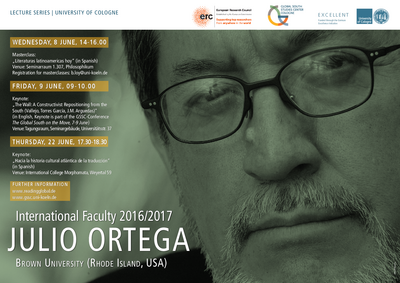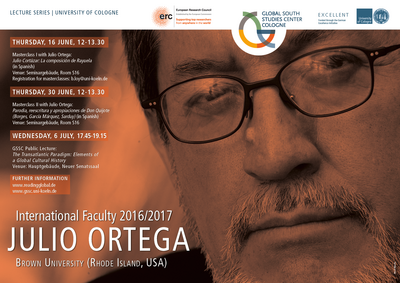Magalí Armillas-Tiseyra (Pennsylvania State University)
Alexander von Humboldt-Stipendiatin 2023-2024
Magalí Armillas-Tiseyra is an associate professor in the Department of Comparative Literature at the Pennsylvania State University and received her Ph.D. from New York University in 2012. Specializing in comparative approaches to the literatures of Latin America, Africa, and, more broadly, the Global South, she is the author of The Dictator Novel: Writers and Politics in the Global South (Northwestern University Press, 2019) as well as numerous articles, book chapters, and essays; more information can be found here: https://www.magaliarmillastiseyra.com/publicationsandeditorialwork. In addition to serving on the editorial boards of CLS: Comparative Literature Studies and MFS: Modern Fiction Studies, Prof. Dr. Armillas-Tiseyra is also co-director of the digital platform Global South Studies and has guest-edited special issues of the journal The Global South ("Dislocations," 7.2, 2013) as well as CLS: Comparative Literature Studies ("New Critical Directions in Global South Studies," 58.3, 2021 and "New Critical Directions in Global South Studies: Continuing the Conversation," 59.1, 2022).
Project:
The Hazards of Comparison: Literary Booms and the Global South in the World Republic of Letters
This project examines periods in which writing from the Global South gains prominence in a world-literary market still largely centered in the global North. These are known as “booms,” originally referring to a moment in the 1960s-1970s when a group of Latin American writers—including such still-prominent figures as Gabriel García Márquez, Carlos Fuentes, and Mario Vargas Llosa—enjoyed unprecedented international acclaim. While attention to new Latin American writing would wane in the later 1970s, the idea of a literary boom retained currency. The term has since been applied to anglophone South Asian literature, which experienced an analogous phenomenon beginning in the 1980s through the start of the present century; to African literature in the last two decades; and, most recently, to a new generation of Latin American women writers. My central research questions concern the construction of the concept of literary booms, beginning with its original Latin American iteration, and the ways in which this concept has been transformed via its subsequent trans-regional circulations. In short: what exactly is a “boom,” and how has the idea of aliterary boom both transformed and been transformed by its circulation to other regions of the Global South? As the first comprehensive study of its kind, bridging often isolated (for linguistic, disciplinary, or other institutional reasons) but very much related debates in Latin American literary studies, African literary studies, and postcolonial studies, as well as the revitalized critical conversation around the concept of world literature, this book aims to fundamentally reframe how literary scholars think about the international circulation of writing from the Global South.
Sophie Esch (Rice University)
Alexander von Humboldt-Stipendiatin 2022-2023
Project:
Animals and Ecologies of War in Contemporary African and Latin American Literature
The project explores the interrelation of humans, nonhuman entities, and war in modern literature from Africa and Latin America. Drawing on a range of prose fiction from countries with recent armed conflicts, namely Mexico, Guatemala, El Salvador, Nicaragua, Colombia, Mozambique, and Angola, this book-length study shows how authors develop complex visions of war by incorporating a host of nonhuman actors into the narrative. Animals in particular become crucial interlocutors to explore various ecological, political, and affective dimensions of war. An invasive hippo population in Colombia provokes a collective reckoning with trauma and vulnerability, whereas a beetle in the Lacandon jungle expounds the possibilities and limits of liberation struggles. Contrary to the anthropocentrism of many war stories, these texts underscore the effect of war on nonhuman entities and viceversa. Bringing together peace and conflict studies, environmental humanities, and postcolonial studies, Animals and Ecologies of War in Contemporary African and Latin American Literature creates a literary-political ecology of war in the Global South that makes it possible to see the complex and peculiar relationships between human and nonhuman entities during war and its aftermath. Literary analysis reveals in these texts a desire to envision other types of communities than those defined by species, kinship, race, nationality, or ideology. The book-length study develops this argument through an original, richly textured comparative work centered on peripheral world literatures from the Global South.
2021-2023
Dr. Carlos F. Grigsby
(Becario de la Fundación Von Humboldt, doctor por la Universidad de Oxford)
Terminó su doctorado en literatura hispanoamericana en la Universidad de Oxford en 2020 y ha sido docente en la misma universidad. Su tesis «Rediscovering Rubén Darío through Translation» analiza la historia de la recepción de Darío en el mundo anglófono y dilucida las causas de su oscuridad en inglés. Asimismo, propone una nueva lectura de la obra dariana al rescatar el multilingüismo de su poesía, además de abordar enfoques desde la teoría de la traducción, la «world literature», los estudios modernistas y la práctica de la traducción misma al ofrecer nuevas versiones de Darío. Durante su estancia en Colonia, trabaja en un proyecto de investigación que propone repensar ciertos eventos de la historia literaria centroamericana desde una perspectiva transnacional y plurilingüe, conectándola con las demás literaturas mundiales. Además de su labor académica, es poeta, traductor y cuentista.
Proyecto: «Rethinking Central American Literature»
2021
DAAD One Year Research Grant:
Ignacio Azcueta (Estudiante de doctorado, Universidad de Harvard)
Ignacio Azcueta es Licenciado en Letras por la Universidad de Buenos Aires. Desde 2015 cursa su doctorado en Lenguas y Literaturas Romances en la Universidad de Harvard. Su tesis “Los detectives melancólicos: Formas de la investigación en la narrativa latinoamericana (1996-2015)” analiza las tensiones entre memoria y archivo desde la teoría de los afectos en la narrativa latinoamericana contemporánea. Ha sido ayudante de cátedra en cursos acerca de la guerra civil española, Jorge Luis Borges, y Gabriel García Márquez entre otros. Asimismo, es co-curador de The present of yesterday, un ciclo de cine on-line que promueve el diálogo entre estéticas contemporáneas de documental y ficción. El ciclo exhibe películas que intentan comprender el presente a través de historias colectivas y memorias personales.
Proyecto: “Obsolete Worlds: Technology as the critical suspension of the global in three key contemporary Latin American authors: Roberto Bolaño, Edgardo Cozarinsky, and Chico Buarque de Hollanda (2003-2015)”
2017
Prof. Dr. Patricia Trujillo (Universidad Nacional de Colombia, DAAD-gefördert)
Patricia Trujillo terminó estudios de pregrado en Literatura en la Universidad Nacional de Colombia. Es magíster en Lenguas, Literaturas y Pensamiento Europeo por el Queen Mary and Westfield College de la Universidad de Londres y doctora en Teoría de la Literatura y Literatura Comparada por la Universidad Autónoma de Barcelona. Ha sido profesora del Departamento de Literatura de la Universidad Nacional desde 2001. De 2005 a 2007 y de 2013 a 2016 fue editora de la revista Literatura, teoría, historia, crítica, publicada por el Departamento de Literatura de la Universidad Nacional de Colombia.
Proyecto: The Novel, Political Projects and the Construction of Memory in Colombia during the Liberal Republic (1930-1946)
International Faculty 2016/2017:
Prof. Dr. Julio Ortega (Brown University)
Zur Person:
Julio Ortega (*1942 in Casma, Peru) zählt zu den renommiertesten lateinamerikanischen Literaturwissenschaftlern und Kritikern des 20. Jahrhunderts überhaupt. Nach Stationen an der University of Texas und Brandeis University ist Ortega seit 1989 Professor an der Brown University am Department of Hispanic Studies. Zahlreiche Gastprofessuren führten ihn sowohl an Universitäten in den USA als auch in Lateinamerika, 1995 war er Simon Bolivar Professor of Latin American Studies an der University of Cambridge.
Aus seinen zahlreichen Veröffentlichungen ragen Werke wie "El discurso de la abundancia" (1992), "Una poética del cambio" (1992), "El sujeto dialógico: negociaciones de una modernidad conflictiva" (2010) oder seine zahlreichen Bände zu transatlantischen Studien sowie den "nuevos hispanismos" heraus. Selbst Zeitgenosse und Wegbegleiter der lateinamerikanischen Boom-Autoren wie García Márquez und Vargas Llosa, hat Ortega zudem eine Reihe vielbeachteter Romane und Erzählbände publiziert und als Herausgeber zahlreicher akademischer Reihen sowie von Werkausgaben von Autoren wie Carlos Fuentes oder Alfonso Reyes fungiert. Zudem schreibt er regelmäßig für internationale Medien wie "El País" in Madrid und ist Träger mehrer Ehrendoktortitel sowie Mitgliedschaften in der Academia de la Lengua in mehreren lateinamerikanischen Ländern.
Kontakt: Julio_OrtegaBrown.edu
Program 2017
Date: Thursday, June 8, 2017 to Thursday, June 22, 2017
Lecture Series with International Faculty 2016/2017
Julio Ortega Brown University (Rhode Island, USA)
Wednesday, 8 June, 14-16.00
Masterclass:
„Literaturas latinoamericas hoy“ (in Spanish)
Venue: Seminarraum 1.307, Philosophikum
Registration for masterclass: b.loy@uni-koeln.de
Friday, 9 June, 09-10.00
Keynote:
„The Wall: A Constructivist Repositioning from the South (Vallejo, Torres García, J.M. Arguedas)“
(in English, Keynote is part of the GSSC-Conference The Global South on the Move, 7-9 June)
Venue: Tagungsraum, Seminargebäude, Universitätsstr. 37
Thursday, 22 June, 17.30-18.30
Keynote:
„Hacia la historia cultural atlántica de la traducción”
(in Spanish)
Venue: International College Morphomata, Weyertal 59
Program 2016
Thursday, 16 June
12.00 – 13.30
Masterclass I with Julio Ortega: ”Julio Cortázar: La composición de Rayuela” (in Spanish)
(Venue: Seminargebäude, Room S16)
Thursday, 30 June
12.00 – 13.30
Masterclass II with Julio Ortega: “Parodia, reescritura y apropiaciones de Don Quijote (Borges, García Márquez, Sarduy)” (in Spanish)
(Venue: Seminargebäude, Room S16)
Wednesday, 6 July
17.45 – 19.15
Public Lectures Series of the Global South Studies Center:
Julio Ortega - "The Transatlantic Paradigm: elements of a global cultural history”
(Venue: Hauptgebäude, Neuer Senatssaal)

